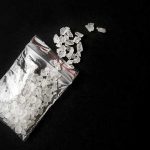One reason crack cocaine is such an addictive drug is that it is smoked rather than snorted. Smoking quickly delivers the drug to the bloodstream, resulting in a more intense and addictive high.
Intense & Brief Crack High
While snorting and smoking can both deliver a large dose of a drug into the body, the large surface area of the lungs absorb more of the drug into the bloodstream. This causes a larger amount to hit the brain with effects that feel almost instantaneous.
This speed of effect and smoking’s higher bioavailability accelerates and intensifies the crack high. There is a larger, shorter-lived release of dopamine that causes a brief, intense, and severely addictive reaction often referred to as a rush.
This rush is why smoking crack is generally more addictive than snorting powder cocaine, despite both forms of cocaine being the same drug with a similar overall effect.
Habit-Forming Effects
Despite being used differently, the overall effects of cocaine and the effects of crack cocaine on the body are the same.
As a central nervous system stimulant, cocaine acts on the brain to increase physical activity. Heart rate, body temperature, breathing, and blood pressure all increase while the drug is active.
In addition, cocaine triggers a major release of the neurotransmitter dopamine, which is responsible for pleasure and habit-formation.
The more dopamine something releases, the more addictive it tends to be. Tolerance and physical dependence may occur after just a few uses. This is why smoking crack cocaine is so intensely habit forming.
Potency
Crack cocaine produces a more powerful high than powder cocaine, but has similar effects on the brain and body. Powder cocaine is converted or “cooked” into crack cocaine with a heat source, water, baking soda, and a spoon.
The ingredients are mixed and heated causing the baking soda to crackle and react with the powder. The freebase cocaine separates out as an oily layer on top of the water and is removed, dried, and formed into waxy rocks that can be smoked with a more potent effect.
Long-Term Effects Of Using Crack
While cocaine and crack cocaine are famous for causing dilated eyes, reduced inhibition, and increased sex drive and aggression, there are variety of other risks that come with crack abuse.
These include:
- high risk for addiction, cravings, and dependence
- increased risk of heart attack, stroke, and other organ failure
- high risk of overdose effects, especially if crack cocaine is used with other drugs including alcohol or opioid narcotics
- “crack lip,” or cracked, burned, and blistered lips and fingers from using crack pipes
- mental health effects like depression, anxiety, aggression, paranoia, and violent impulses
- brain damage impacting thinking, personality, memory, and motor control
- difficulty sleeping, malnutrition, and unhealthy weight loss
Treatment Options For Crack Addiction
As with other forms of substance use disorder, crack cocaine addiction can be treated in a professional setting using a variety of treatment types.
These can include:
- medical detox that addresses withdrawal symptoms
- inpatient care, which provides 24/7 access to staff and intensive treatment programs inside a specialized addiction treatment facility
- outpatient care, offering participants the flexibility to attend treatment sessions while continuing to live at home
- behavioral therapies, which aim to help you understand and change your thinking, feelings, and coping mechanisms as they relate to substance abuse
- aftercare services and support groups, which can help support participants in drug-free living after treatment
If you or your loved one struggle with cocaine abuse and are ready to make a positive change, please contact our staff today.
Sources
- Drug Enforcement Administration (DEA) — COCAINE (Street Names: Coke, Snow, Crack, Rock)
- Experimental and Clinical Psychopharmacology — Smokers versus snorters: Do treatment outcomes differ according to route of cocaine administration?
- National Institute on Drug Abuse (NIDA) — What are the long-term effects of cocaine use?
Written by
Northeast Addition Editorial Team
©2024 Northeast Addition Center | All Rights Reserved
This page does not provide medical advice.






